MARVELLOUS MACHINES: Technology in picture book illustration • Jonathan Emmett
 Understanding how it all fits together is no mean feat.
Understanding how it all fits together is no mean feat.One of David Parkins's techtastic illustrations for Eileen Browne's story, No Problem.
I’m a bit of a technophile and several of my picture books, such as Callum’s Incredible Construction Kit and Tom’s Clockwork Dragon have a technological theme. I’d like to think that my enthusiasm for technology comes across in my writing, but the writing only tells half the story in a picture book, the other half being told by the illustrations.
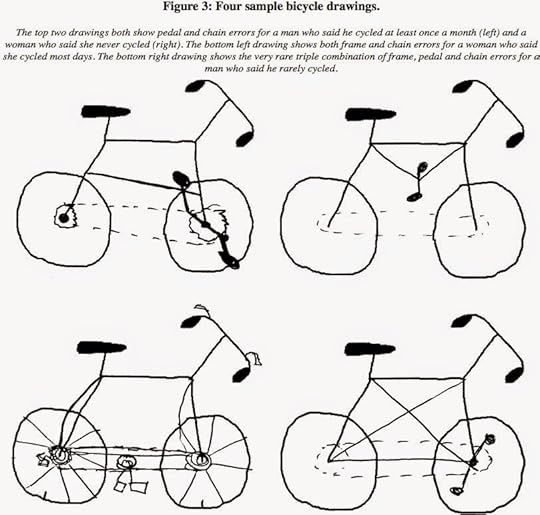 Some of the fundamentally flawed bicycle
Some of the fundamentally flawed bicycledrawings from Rebecca Lawson’s studyTo draw a machine or mechanism well, an illustrator has to understand how it’s put together and operates. This cognitive skill doesn’t always go hand in hand with artistic ability and is relatively uncommon, not just among illustrators, but among the population as a whole.
Cognitive psychologist Rebecca Lawson demonstrated this last point with a series of experiments in which subjects were asked to either draw or complete a drawing of a bicycle. The bicycle is a simple machine that most people will have been familiar with from an early age and even non-cyclists encounter them regularly. While many people may think that they understand how a bicycle is put together, Lawson’s experiments (which she later published as a paper) show that relatively few people are able to draw one without making fundamental errors — even when they are shown a real bicycle as they're being tested!
Having established how rare this ability is, here are 10 techtastic picture book illustrators who excel at drawing machines.
You can see every nut, bolt and washer in David Parkins ’s wonderful illustrations for No Problem, written by Eileen Browne. This book is one of my all-time favourite picture books about technology and was a huge bedtime favourite of my son’s.

The extraordinary Chris Riddell seems to excel at drawing everything and technology is no exception. The robots that inhabit Wendel’s Workshop demonstrate how technically detailed illustrations can also be brimming with character.
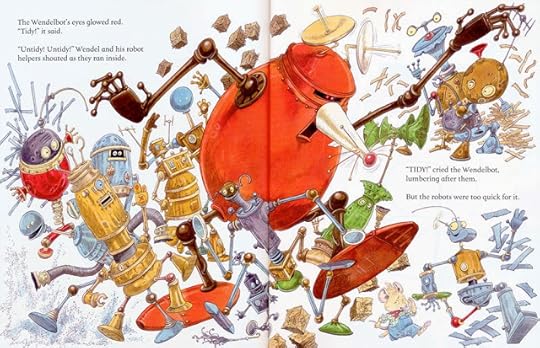
Mark Oliver, who created Monster’s - An Owner’s Guide with me, cites his engineer father as an inspiration for much of his work. Mark once told me that the key to drawing technology well is that, “it has to look like it could work.”

Jonny Duddle ’s The King of Space is full of superbly drawn spaceships and robots. Rex, the book’s anti-hero, lives on a farm which may be why the huge “warbot” he constructs looks like it’s made from tractor parts.
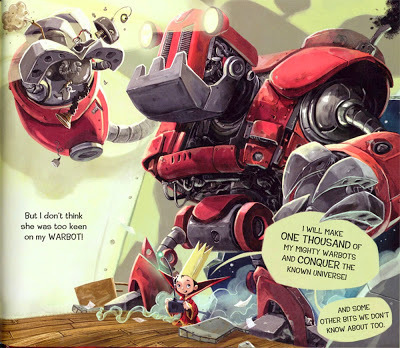
Ted Dewan ’s re-telling of The Sorcerer’s Apprentice replaces magic with technology, and the work-shy human apprentice with an equally work-shy robot.

Although some of Callum’s creations in Callum’s Incredible Construction Kit are huge, Ben Mantle ’s brilliantly detailed illustrations make it clear that they are constructed from pieces that a child could handle and assemble on his own.

William Bee ’s illustrations for And the Train Goes are packed with the sort of wonderful technical detail that’s rarely found in picture books for the very young.

While cross sections are more commonly found in non-fiction, Steve Cox ’s design for the crocodile submarine in our picture book The Treasure of Captain Claw was so stunning that publisher Orchard gave Steve this huge gatefold to show it off. Click here to see a much larger version in Steve's Flickr album.

No list of techtastic illustrators is complete, without the grandaddy of them all, Heath Robinson. This illustration is from Railway Ribaldry , published for the centenary of the Great Western Railway in 1935.
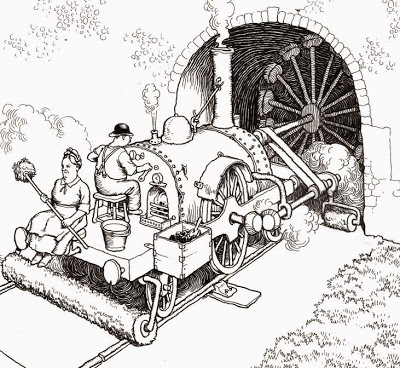
And finally, I couldn’t resist sneaking in an illustration from The Clockwork Dragon (a reworking of Tom’s Clockwork Dragon), my forthcoming picture book with Elys Dolan . Elys is a self-confessed armour nut, and this certainly shows in her splendid illustrations of the eponymous dragon, which is made from recycled from arms and armour.

Do you have a favourite picture book featuring marvellous machinery that I haven’t mentioned? If so, tell us about it in the comment box below.
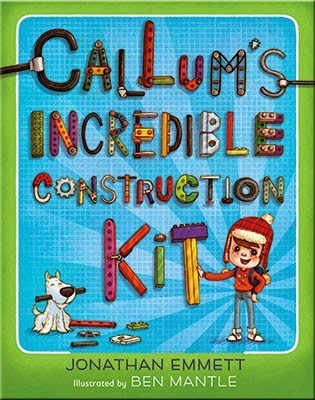 Jonathan Emmett's most recent techtastic picture book is
Callum’s Incredible Construction Kit
, illustrated by Ben Mantle and published by Egmont.
Jonathan Emmett's most recent techtastic picture book is
Callum’s Incredible Construction Kit
, illustrated by Ben Mantle and published by Egmont.
Find out more about Jonathan and his books at his Scribble Street web site or his blog. You can also follow Jonathan on twitter @scribblestreet.
See all of Jonathan's posts for Picture Book Den.
Published on November 15, 2014 23:00
No comments have been added yet.



